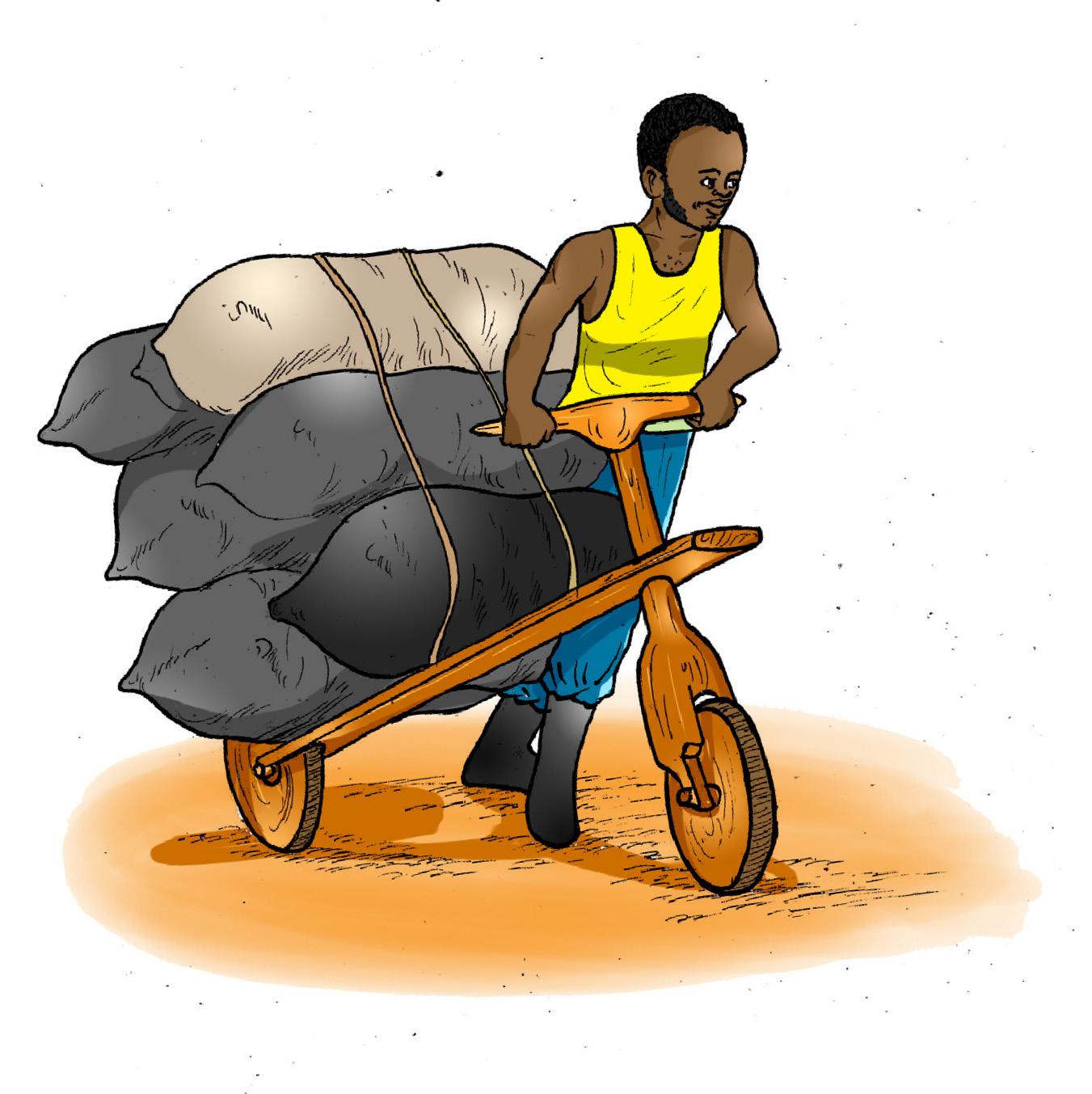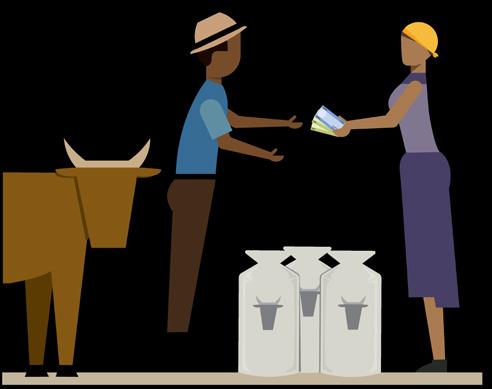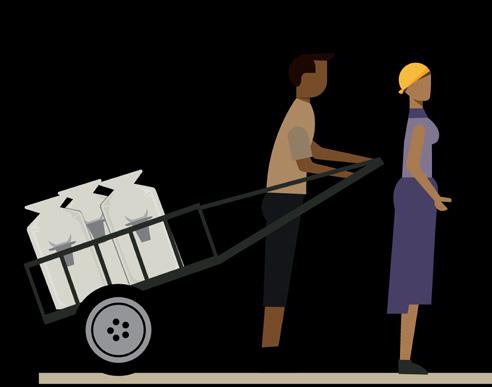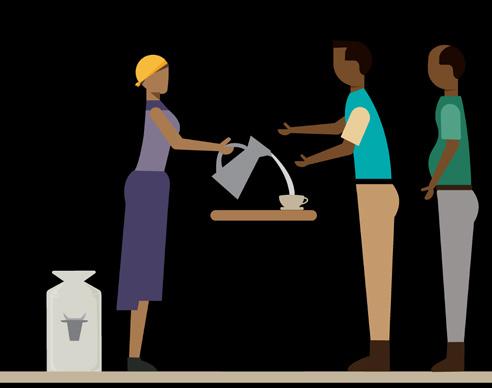
5 minute read
Lesson 2. Doing business properly
Anchor Scripture:
• Proverbs 14:23: All hard work brings a profit, but mere talk leads only to poverty. • Colossians 3:23-24: Whatever you do, work at it with all your heart, as working for the Lord, not for human masters, since you know that you will receive an inheritance from the Lord as a reward. It is the Lord Christ you are serving.
Advertisement
Specific training objectives: By the end of this session, participants will be able to: • Appreciate the purpose of owning business • Recognize the qualities of a good businessperson • Understand categories of business • Manage a business to ensure profitability
Ask the trainees to define “Business.” Do they know some businesspeople in their area? Do they consider themselves businesspeople? Are businesspeople considered good or bad? Why do they say the businessperson is good or bad?
A) What is a BUSINESS?
• An activity operated for the purpose of earning a Profit by providing a service or a product. • It involves a businessperson putting money, time, and hard work into the business activity
B) Categories of businesses
Businesses can be categorized according to their activities as follows: • Manufacturing / Production - Make or process raw materials into finished products. Cotton is used to produce cloths and grasses produce a mat. Raw food materials processed or cooked into ready to eat foods. Agave sisalana are used to make baskets. These things can be sold one piece at a time or sold in bulk wholesale to a shop. • Service - Provide labour that does not produce a tangible product (schools,
transport, beauty salon, childcare, domestic work) • Retail - Selling goods directly to consumers • Agriculture - Growing crops or rearing livestock for sale (manure, meat, milk, and retain for the market sale
C) What are the qualities of a good business?
(Why do they say that there isn’t a businessperson who will go to heaven?)
NSENGIMANA’s RETAIL SHOP
Read aloud: Nsengimana owns the biggest retail shop in town. He manages his business which has 5 employees. His employees like working for him because he is an organized man and he treats them well. Nsengimana started his business with his savings earned from farming and selling beans. The business was tiresome but Nsengimana was happy to make some small amount of money that he saved. He sacrificed many things to start his business. He started the business by renting a small shop to sell a very limited stock. His customers have now increased; they say he is friendly and treats them with respect. He is also hard working and disciplined. Nsengimana also stocks good quality products and ensures he has all the customers need. He is also honest and gives fair prices to his customers. “Nkurunziza, the previous shop owner was the very opposite of Nsengimana in everything, no wonder his business failed within 6 months” Says Shema, a customer who has lived in the town long enough.
Group discussion
• List the personal qualities that contribute to Nsengimana’s business success.
• List personal qualities that contributed to Nkurunziza’s business failure.
Personal qualities that enhance success in business can be learned. Business persons need the following qualities to succeed: • Willingness to sacrifice time and money for the sake of the business • Good people skills • A good leader • A good organizer • Can make good judgments and decisions • A good manager
• Has or is willing to gain experience • Committed to succeed
Businesspeople can set up a good business that has these qualities: • It is registered with authorities • It pays taxes to RRA • It fulfils specific needs of customers • It is reliable – opens and closes at standard times each day • It cares about the environment
D) Business activities
Explanation: There are 3 things that are required in business:



Buy Transport Sell
1. Inputs. These are the tangible things that are “put in” for the business to operate. For a shop, cash is an input, for a farm seed is an input. For a service, the equipment or supplies you need to do the service are an input. 2. Operational activities. These are the various tasks or activities that must be carried out for the business to produce results. 3. Marketing activities: These are the tasks related to promoting the business products to customers.
E) What is Profit?
• The amount that remains after subtracting the cost of providing the service or product (expenses) from what one gets after selling (revenue). • When the expenses are higher than revenue, the business makes a loss.
How can a business be profitable?
• When the cost of producing the goods or service does not exceed the selling price • When a business person employs honest workers • When the business person manages money carefully, like: * Saving the business income with a bank * Separating business income from household income * Keeping records * Planning expenses
F) To successfully manage a business, a business person must:
• Meet the customer’s need • Plan business activities • Buy the right materials at the best prices at the right time • Control business expenses and ensure there is money to meet business needs • Keep records of the business finances, stocks, and investments • Adapt the products or services to what is in demand
Exercise: Ask the group to name one business in the area, e.g a milk vendor’s shop. Ask them to identify the inputs, operational activities, and marketing activities involved in the business in order to make profit.
Closing activity: Ask the group to share one thing they will put into practice to improve how they do business this week. Maybe it is record keeping, asking their customers what they need, etc. Depending on the size of the group, you could have them share with the whole group or with one or two people sitting near them.
Key learning points
• Business is an activity operated for the purpose of earning a profit by providing a service or a product • Business can be grouped into Manufacturing/Production, Retail, Service and Agriculture • Business activities include providing the inputs, operational activities, and marketing activities. • Profit is the amount that remains after subtracting the cost of giving the service or product from what one gets after selling.









